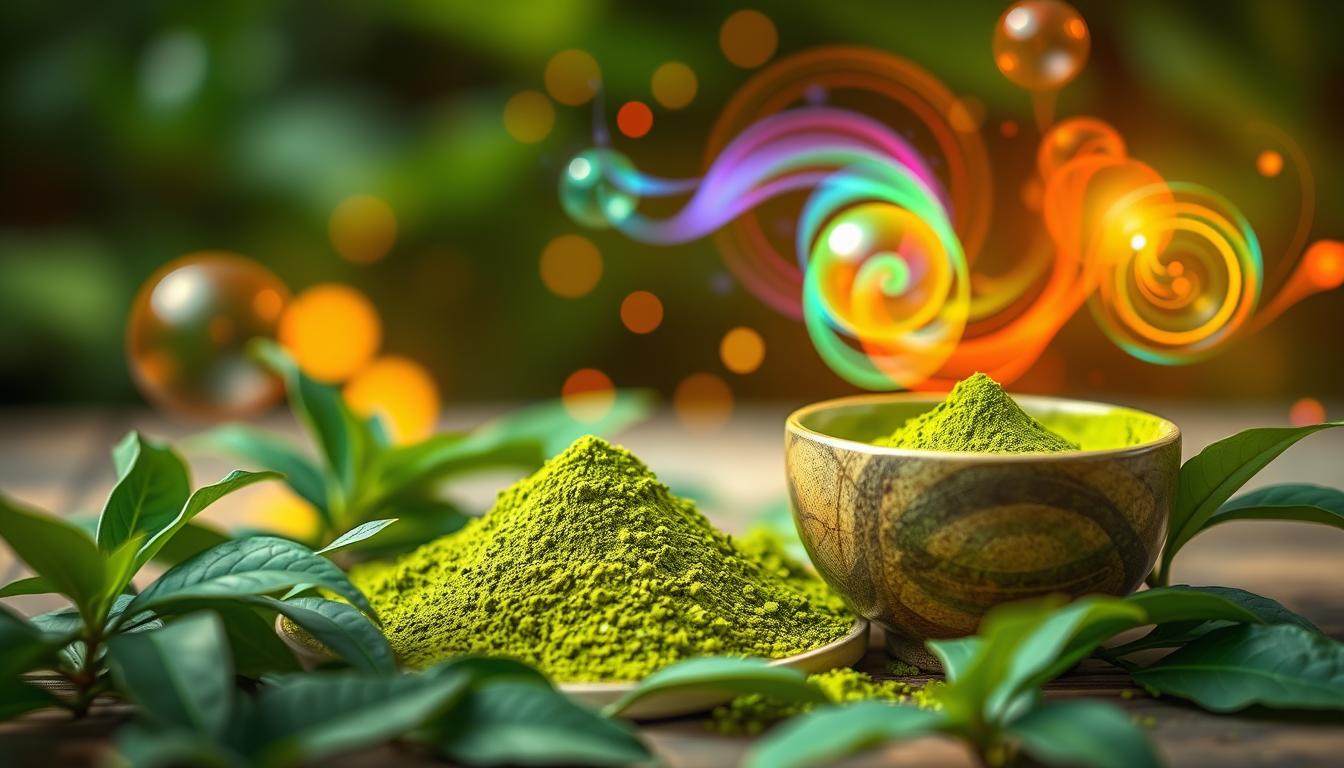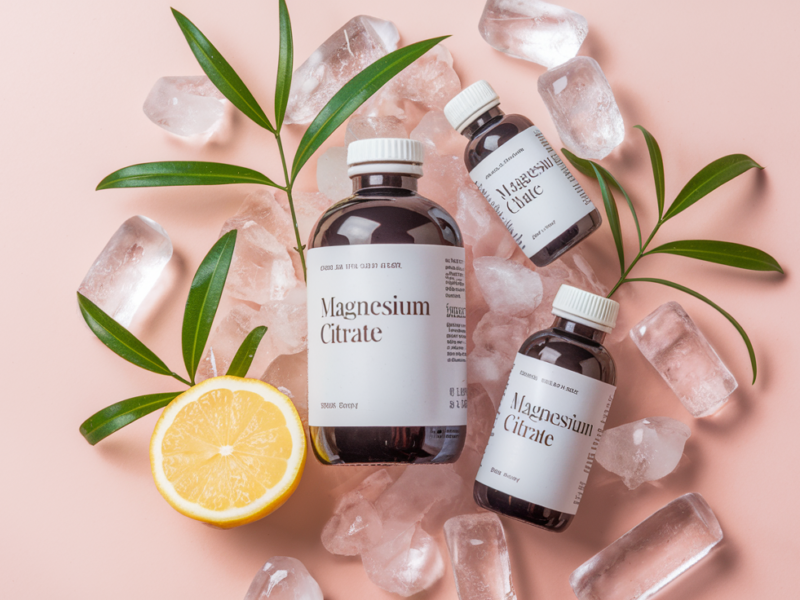Are you looking for natural ways to support your immune system? Green tea and matcha are great options. They are full of antioxidants and polyphenols that help fight off illness and disease.
Green tea and matcha have a lot of EGCG, a strong antioxidant. It helps reduce inflammation and boost immunity. The catechins in these teas might also fight off viruses like the flu and herpes.
Matcha is a more concentrated form of green tea. It has even more EGCG and catechins because of how it’s grown and made. Drinking matcha gives your immune system a big boost of antioxidants and nutrients.
Key Takeaways
- Green tea and matcha are rich in immune-boosting antioxidants like EGCG and catechins
- Matcha contains higher concentrations of beneficial compounds compared to regular green tea
- The antioxidants in these teas can help reduce inflammation and protect against viral and bacterial infections
- Consuming green tea and matcha regularly may support overall health and disease prevention
- Matcha has the highest antioxidant rating among major superfoods, making it a potent addition to your diet
Green Tea: An Ancient Remedy for Modern Times
Green tea has been loved in ancient China for thousands of years. It comes from the Camellia sinensis plant. Today, it’s a key part of many wellness routines.
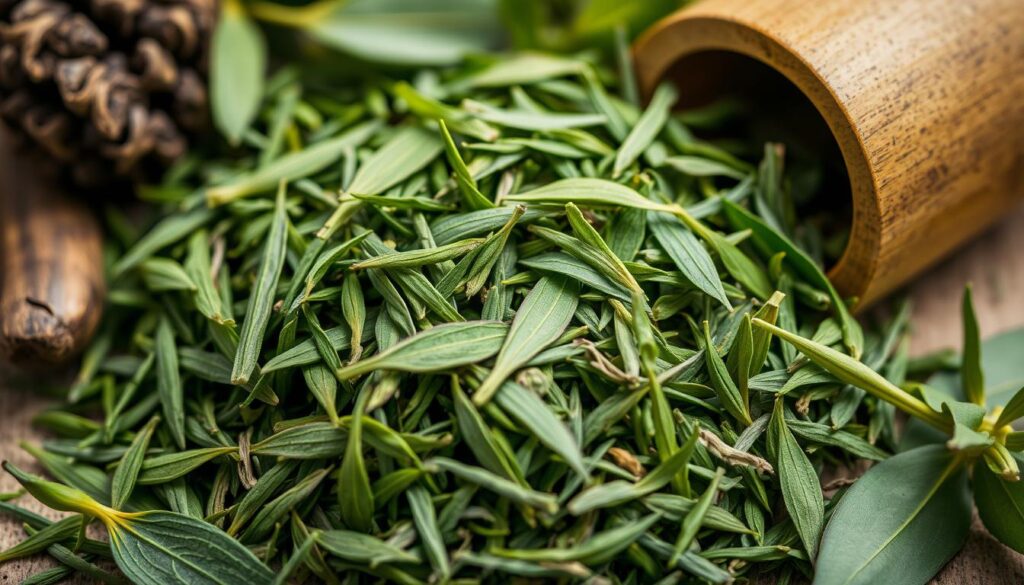
Green tea comes in many forms. You can choose loose leaf tea or teabags. There are many types like Sencha, Gyokuro, and Dragonwell. Each has its own taste and health benefits.
History of Green Tea in Ancient China
Green tea started in ancient China. It was first used as medicine. Chinese leaders and scholars loved it for its health benefits.
It soon spread to Asia and then to the West.
Different Types of Green Tea
There are many green teas. Each has its own taste and way of making. Here are some popular ones:
| Type of Green Tea | Description |
|---|---|
| Sencha | The most common type of green tea in Japan, known for its refreshing taste and grassy aroma. |
| Gyokuro | A premium Japanese green tea that is shaded before harvesting, resulting in a sweeter, less astringent flavor. |
| Dragonwell | A famous Chinese green tea, characterized by its flat, sword-shaped leaves and nutty, slightly sweet taste. |
| Matcha | A finely ground powder made from shade-grown green tea leaves, traditionally used in the Japanese tea ceremony. |
Green tea is great whether you use teabags or loose leaf. It’s good for you and tastes great. Enjoying green tea connects you to a long tradition of health and flavor.
Matcha: A Concentrated Form of Green Tea
Matcha is a finely ground powder from green tea leaves. It’s very popular for its taste and health benefits. This green powder is tasty and full of nutrients that help your immune system and health.
How Matcha is Made
To make matcha, tea plants are shaded for 20 days before picking. This makes the leaves sweeter and greener. The leaves are then picked, steamed, dried, and ground into a fine powder.
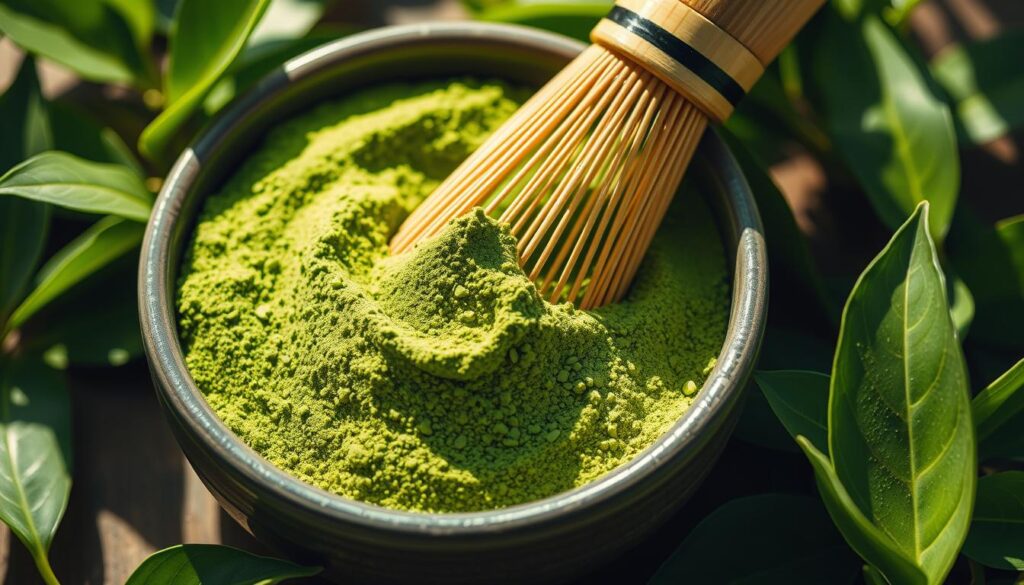
Nutritional Differences Between Matcha and Green Tea
Matcha and green tea come from the same plant, Camellia sinensis. But matcha has more antioxidants and nutrients. This is because you drink the whole leaf with matcha, not just the water like with green tea.
Matcha has 137 times more antioxidants than green tea. It has EGCG, which is good for your health. It helps fight infections, lose weight, and improve heart and brain health.
- Boosts the immune system by fighting bacterial and viral infections
- Promotes weight loss by increasing metabolism and fat burning
- Improves heart health by reducing bad cholesterol levels
- Enhances brain function, memory, and concentration
- Reduces inflammation and oxidative stress in the body
Matcha also has more theanine, which helps you relax without feeling sleepy. This mix of caffeine and theanine gives you energy without the jitters.
Versatility of Matcha in Recipes
Matcha’s flavor and color make it great for many recipes. You can drink it hot or cold, add it to smoothies, or use it in baked goods. It’s also good in savory dishes like salad dressings and sauces.
“Matcha is not just a drink; it’s a way of life. It’s a mindful practice that allows you to slow down, appreciate the moment, and nourish your body with the goodness of nature.” – Yoshiko Suzuki, Japanese Tea Master
Adding matcha to your daily routine can bring many health benefits. It’s also delicious and versatile.
Antioxidants and Polyphenols: The Immune-Boosting Powerhouses
Green tea and matcha are full of strong antioxidants and polyphenols. They help your immune system a lot. These compounds fight off bad free radicals and lower oxidative stress. This can prevent chronic diseases and slow down aging.
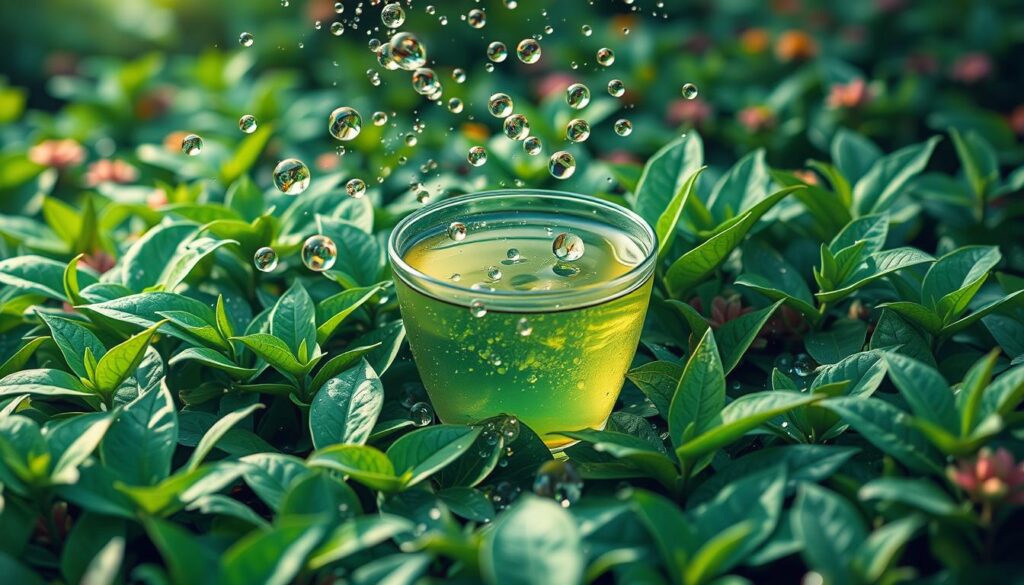
EGCG: The Most Potent Antioxidant in Green Tea
Epigallocatechin gallate (EGCG) is a top antioxidant in green tea and matcha. Matcha has way more EGCG than regular green tea. This flavonoid is good for many things, like:
- Boosting fat burning during exercise
- Lowering inflammation and making your immune system stronger
- Keeping your brain sharp and improving memory
Catechins and Their Antiviral Properties
Green tea and matcha also have catechins. These have shown to fight viruses in studies. They might help protect against viruses like the flu, adenovirus, and hepatitis. Matcha tea is very good at fighting off free radicals:
| Type of Matcha | Temperature (°C) | Antioxidant Level (µM Fe(II)/dm3) |
|---|---|---|
| Traditional Matcha | 25 | 5863.03 – 6129.53 |
| Daily Matcha | 25 | 5767.30 – 5896.95 |
| Traditional Matcha | 90 | 6129.53 |
| Daily Matcha | 90 | 5896.95 |
Matcha’s antioxidant power goes up with temperature, peaking at 90 °C. Traditional Matcha always has more antioxidants than Daily Matcha.
Matcha has over 10 times more antioxidants than regular green tea. It’s a strong source of antioxidants.
Adding green tea and matcha to your daily life can boost your health. These antioxidants and polyphenols support your immune system and overall well-being.
Green Tea and Matcha: Proven Immunity Enhancers
Green tea and matcha are great choices for a healthy drink. They are full of antioxidants, like catechins, which help fight off sickness. Drinking a tea with catechins every day for 12 weeks can cut the risk of getting sick by half.
These teas have special compounds that help our immune system. They work by turning on certain receptors in our body. This helps our body fight off bad guys better.
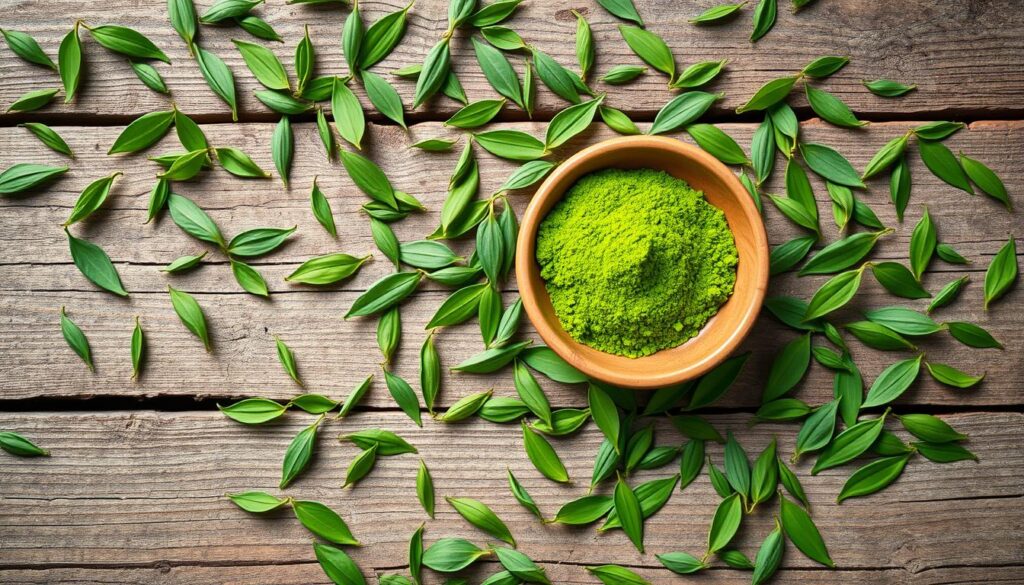
It’s important to choose high-quality tea. Matcha, for example, is very good for you. It has caffeine and L-theanine, which give you energy without feeling jittery.
Green tea and matcha do more than just fight off infections. They can also help your heart stay healthy. They might even help control blood sugar and reduce belly fat.
“Natural products, such as herbal medicines, probiotics, vitamins, polyphenols, and fatty acids, are estimated to contribute to about 70% of drugs on the market.”
So, whether you like matcha or green tea, adding them to your day can make you stronger. They are natural ways to boost your health and keep you feeling good.
Creative Ways to Incorporate Green Tea into Your Diet
Drinking green tea or matcha is great for a healthy lifestyle. But, did you know you can use them in cooking too? Adding green tea and matcha to your food can boost your health. It also makes your meals taste better.
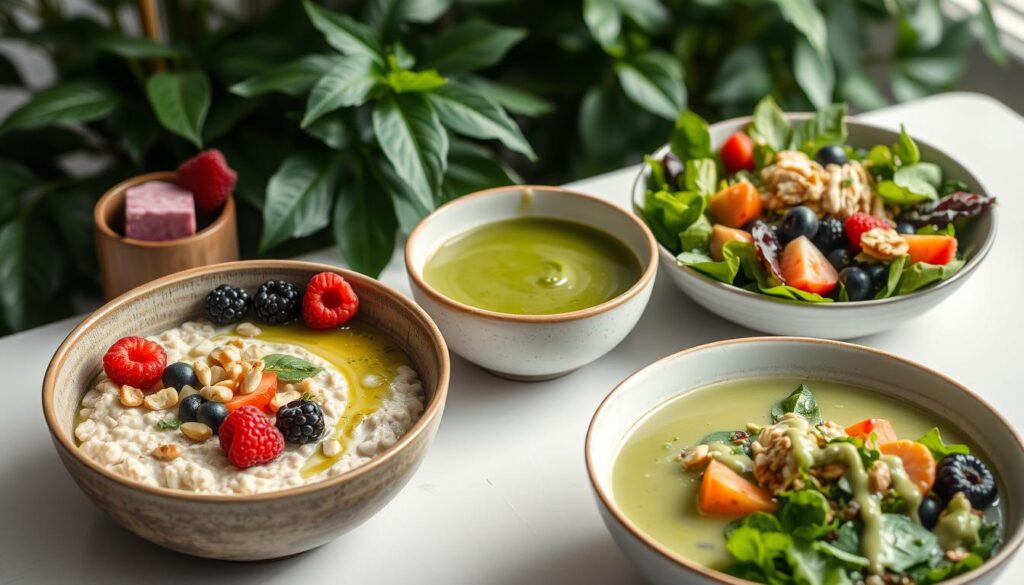
Green Tea Oatmeal Recipe
Begin your day with green tea oatmeal. Use strong green tea as the liquid for your oatmeal. Top it with berries, nuts, and honey for a tasty, healthy breakfast.
Immune-Boosting Green Tea Chicken Soup Recipe
Make a green tea chicken soup to boost your immune system. Use green tea as the soup base. Add chicken, veggies, and spices for a meal that’s good for you.
Matcha Salad Dressing Recipe
Give your salads a green color and a special flavor with matcha dressing. Mix matcha powder, olive oil, lemon juice, and honey. It’s a tasty, healthy dressing for any salad.
Matcha has many benefits for your diet:
| Benefit | Description |
|---|---|
| Sustained Energy Boost | Matcha gives you energy without the jitters of coffee or energy drinks. |
| Enhanced Concentration | Matcha’s caffeine and L-theanine improve focus by making alpha waves in the brain. |
| Immune System Support | Matcha strengthens your immune system by stopping viruses and bacteria with EGCg. |
| Weight Loss Aid | Matcha helps with weight loss by speeding up your metabolism with EGCg and caffeine. |
| Improved Heart Health | Drinking matcha regularly may make your heart healthier, reducing heart attack or stroke risk. |
Adding green tea and matcha to your meals is easy. It helps you stay healthy and feel good every day.
Additional Health Benefits of Green Tea and Matcha
Green tea and matcha are good for more than just fighting off sickness. They help your brain work better, focus, and think clearly. L-theanine makes you calm and less worried, while caffeine gives you energy without feeling jittery.
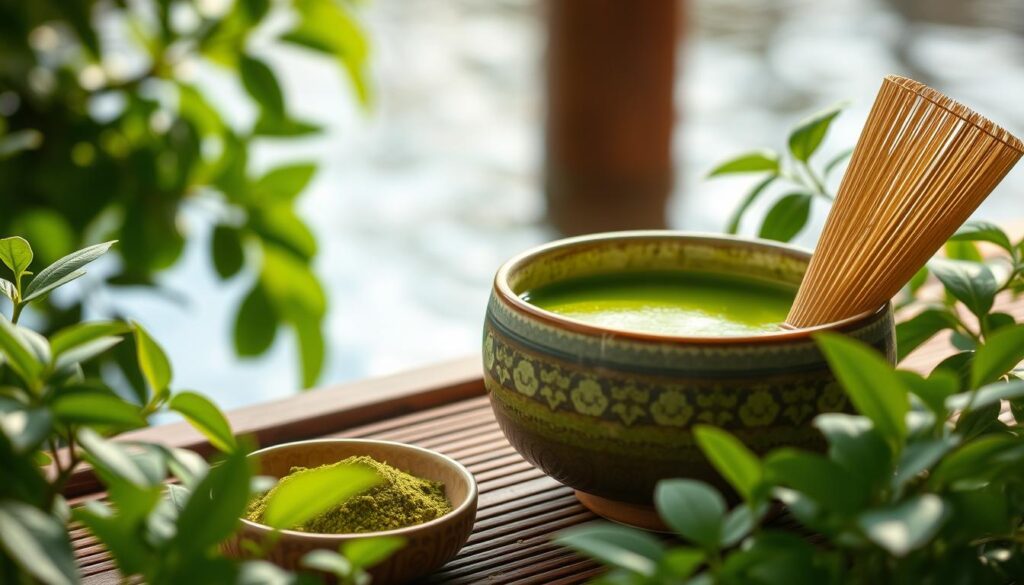
Matcha has lots of EGCG, a strong antioxidant. It stops many sickness-causing germs and helps burn fat. This makes it great for losing weight.
Improved Brain Function and Focus
Matcha makes your brain work better, pay attention, and remember things. It has l-theanine for calm and caffeine for energy. This combo helps you focus and be more productive.
Increased Relaxation and Reduced Stress
L-theanine in green tea and matcha helps you relax and feel less stressed. It works with caffeine to give you energy without feeling anxious. Drinking these teas regularly can make you feel better overall.
Potential Weight Loss Aid
Green tea and matcha might help you lose weight by speeding up your metabolism. A study showed they can make you thinner and have less body fat. The EGCG in matcha makes you feel full, helping you eat less and lose weight.
| Benefit | Green Tea | Matcha |
|---|---|---|
| EGCG Content | 1x | 137x |
| L-Theanine Content | 1x | 5x |
| Antioxidant Rating (ORAC) | 253 units/g | 1384 units/g |
Choosing High-Quality Green Tea and Matcha
When picking the best green tea and matcha, quality matters a lot. Choose organic ones to avoid harmful chemicals. Look at how they were grown, as it affects taste and health benefits.
Keeping green tea and matcha fresh is important. Store them in tight containers, away from light and heat. Good matcha looks vibrant green and feels smooth.
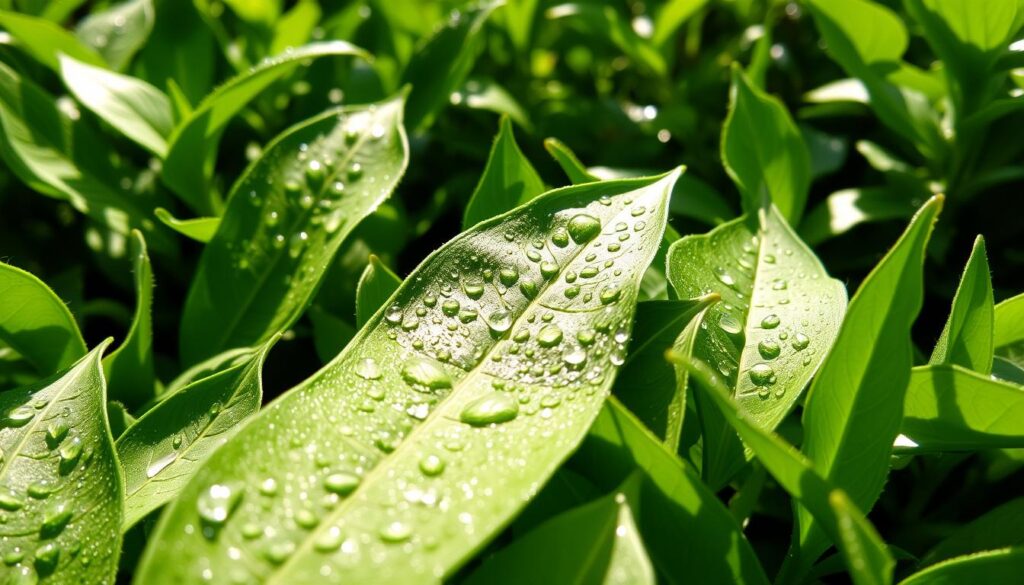
For high antioxidants, try Japan Sencha Kakagawa or Dragonwell green tea. For more benefits, try Pomegranate Hibiscus Green Tea. It adds vitamins from hibiscus.
Quality green tea and matcha are key for health benefits. Choose organic, well-grown, and stored properly. This way, you get the most from each cup.
Recommended Daily Intake for Optimal Benefits
Enjoying green tea and matcha boosts your immune system. But, finding the right amount is important. Most people can safely have 2-3 cups of green tea a day or 1-2 teaspoons of matcha powder. This helps you feel energized without the jitters from coffee or energy drinks.
Matcha gives you energy like a shot of espresso but lasts longer. It’s made from 100% green tea leaves. This means you get more nutrients like caffeine, vitamins, and fiber than other green teas.
Caffeine Content Considerations
Green tea and matcha are good for you but watch their caffeine. Too much can upset some people. A half teaspoon (1 gram) of matcha has:
- 3 calories
- 1 gram of protein
- 0 grams of fat and carbohydrates
- 1 gram of fiber
- 0 grams of sugar
Choose high-quality matcha like Premium or Ceremonial grade for the best taste. Keep your matcha in an airtight container in the freezer or fridge. This way, it stays fresh for up to 2 months. Drinking the right amount of green tea or matcha daily boosts your health and immune system.
Precautions and Possible Side Effects
Green tea and matcha are good for you, but know the risks. Green tea has caffeine, which can mess with sleep, make you anxious, and upset your stomach. If you’re sensitive to caffeine or have health issues, talk to your doctor first.
Matcha has more caffeine and stuff than green tea. Too much matcha can make you:
- Insomnia
- Anxiety
- Digestive problems
- Headaches
- Irritability
Green tea and matcha might mess with some medicines. If you’re on blood thinners or blood pressure meds, check with your doctor first.
Women who are pregnant or breastfeeding should be careful with green tea and matcha. Too much caffeine can harm the baby or make the baby fussy. It can also mess with the baby’s sleep.
To avoid problems, drink green tea and matcha in small amounts. Here’s a safe amount to drink each day:
| Type | Safe Daily Intake |
|---|---|
| Green Tea | 3-5 cups |
| Matcha | 1-2 tsp (2-4 g) |
Everyone reacts differently to caffeine and stuff in green tea and matcha. Pay attention to how you feel. If you have bad reactions or worries, ask your doctor for help.
Making Green Tea and Matcha Part of a Healthy Lifestyle
Adding green tea and matcha to your daily life is easy and good for you. They help keep your immune system strong and improve your health. Drinking them regularly can boost your antioxidant intake and sharpen your mind.
But, remember, green tea and matcha are just part of a bigger health plan. Eating a balanced diet full of fruits, veggies, whole grains, and lean meats is also key. This diet gives your body the nutrients it needs to work well.
Also, regular exercise is vital for staying healthy. Try to do at least 150 minutes of moderate exercise or 75 minutes of hard exercise each week. Plus, do strength training twice a week. Exercise helps keep you at a healthy weight, boosts your immune system, lowers stress, and makes you feel better.
“Taking care of your body and mind through a balanced diet, regular exercise, and stress management techniques is the key to unlocking the full health benefits of green tea and matcha.”
Lastly, managing stress is very important for a healthy life. Too much stress can hurt your immune system and lead to health issues. Try meditation, deep breathing, yoga, or hobbies to reduce stress. The L-theanine in green tea and matcha also helps you relax and stay calm.
By using green tea and matcha as part of a complete health plan, you’ll enjoy their many benefits. These include boosting your immune system and improving your health.
Conclusion
Green tea and matcha are great for your immune system and health. They have lots of antioxidants like EGCG and catechins. These help fight stress and viruses.
Try adding them to your meals with fun recipes. This way, you get to enjoy their benefits and mix up your food.
Choose high-quality green tea and matcha for the best nutrition. Matcha has lots of EGCG, making it very good for you. But, drink them in moderation. Too much caffeine can be bad.
Green tea and matcha do more than just boost your immune system. They might help your heart, brain, and even prevent some cancers. Adding them to your life can make you feel better and taste great in many dishes.
